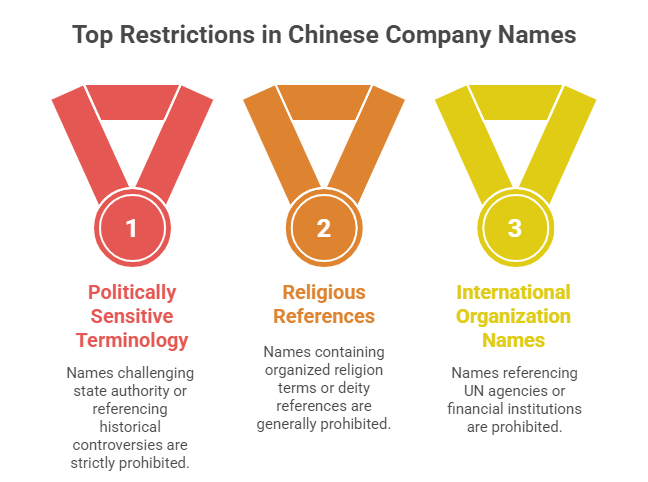When establishing a business entity in China, choosing an appropriate company name is more than just a branding exercise—it’s a legal compliance requirement. China’s company naming regulations contain strict prohibitions that foreign investors must understand to avoid costly registration rejections or potential legal consequences.

Understanding China’s Company Name Structure
Chinese company names follow a standardized format:
- Administrative Division: The location (province/city) where the company is registered
- Trade Name: Your unique brand identifier (2+ Chinese characters)
- Industry Description: Reflects primary business activities
- Organizational Form: “Co., Ltd” or other approved structures
The trade name (字号) is where most compliance issues arise, as it’s subject to the strictest regulations.
Absolute Prohibitions in Chinese Company Names
1. Politically Sensitive Terminology
Chinese authorities prohibit any names that could:
- Challenge state authority (“AntiParty”)
- Reference historical controversies (“Nanking1937”)
- Contain separatist connotations (“EastTurkestan”)
- Use leader names (“MaoZedong Tech”)
Real case: A Shanghai-based e-commerce startup was rejected for attempting to register “RedGuard Trading”—a term associated with the Cultural Revolution.
2. Religious References
Names cannot contain:
- Organized religion terms (“Buddha Foods”)
- Deity references (“Allah Trading”)
- Sectarian terminology (“Catholic Consulting”)
Exception: Registered religious organizations may apply for special approvals.
3. International Organization Names
Prohibited elements include:
- UN agencies (“WHO Partners”)
- Financial institutions (“WorldBank Capital”)
- Treaty organizations (“NATO Security”)
4. Restricted Geographic Indicators
You cannot use:
- National prefixes (“China”/”National”) without State Council approval
- Higher-level administrative divisions than your registration location
- Foreign country/region names (“Germany Holdings”)
Common Commercial Terms That Get Rejected
1. Superlatives and Absolute Claims
Banned descriptors:
- “Best”/”Supreme”/”Perfect”
- “National Leader”/”Global Champion”
- “Guaranteed”/”100% Effective”
Exception: Terms with alternative meanings may be approved (“Peak” as a mountain reference).
2. Industry-Specific Restrictions
- Financial: “Bank”/”Insurance”/”Trust” require special licenses
- Education: “University”/”Institute” need MOE approval
- Medical: “Hospital”/”Clinic” require health permits
3. Numeric and Symbol Issues
- Arabic numerals (“365 Retail”) are prohibited
- Special characters (“@”/”&”) are invalid
- Roman letters must be trademarked first
Practical Compliance Checklist
- Verify Character Meanings: Consult native speakers to check for hidden connotations
- Search Existing Names: Use the National Enterprise Credit Information Publicity System
- Prepare Alternatives: Have 3-5 backup names (40% of applications get rejected initially)
- Consider Cultural Context: Avoid homophones with negative meanings (e.g., “4” sounds like “death”)
- Professional Verification: Our Official Enterprise Credit Report service includes name availability checks
Consequences of Non-Compliance
- Registration Rejection: Average 15-30 day delay per rejection
- Post-Registration Penalties:
- Fines up to ¥200,000 ($28,000)
- Forced name changes (disrupting operations)
- Brand equity loss from rebranding
- Reputational Damage: 68% of Chinese consumers distrust companies with naming violations (2024 China Consumer Trust Survey)
Special Considerations for Foreign Brands
When localizing international brands:
- Phonetic translations may create unintended meanings (e.g., “Sprite” became “雪碧” – “Snow Jade”)
- Direct translations often violate regulations (e.g., “General Motors” had to register as “通用汽车”)
- Trademark ≠ Company Name: Separate registration processes
Pro Tip: Many multinationals maintain distinct legal names (compliant) and brand names (marketing).
Recent Regulatory Updates (2024)
- Stricter enforcement of “core socialist values” in names
- Expanded blacklist of historical references
- Tighter controls on fintech-related terminology
- Mandatory name changes for non-compliant existing companies
For comprehensive due diligence on Chinese entities, consider our Professional Enterprise Credit Report covering legal, operational and compliance risks.
Conclusion
Navigating China’s company naming regulations requires understanding both written rules and unwritten cultural norms. Foreign investors should treat name selection as a strategic compliance exercise rather than purely creative branding. With proper preparation and professional verification, businesses can establish compliant, memorable identities in the Chinese market.
